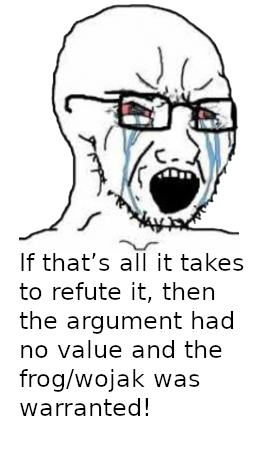





A wojak image can’t really refute anything; it’s just depicting the original poster as being a seething dumbass (an ad hominem response). If the poster accompanies said wojak image with a counterargument, that could refute something, but most wojak responses don’t bother with actually making any kind of salient point. Which is why it’s such a popular format: it’s low effort.
Edit: Realizing the error in my argument, I have included the following addendum:



I took a cursory glance through the source code (for the Firefox version, at least), and I’m not seeing any calls to the gitflic.ru URL outside of the update functions (there appear to be two different places where these might be triggered) and one function for importing custom sites:
// Import custom sites from local/online
function import_url_options(e, online) {
let url = '/custom/sites_custom.json';
if (online)
url = 'https://gitflic.ru/project/magnolia1234/bpc_updates/blob/raw?file=sites_custom.json' + '&rel=' + randomInt(100000);
try {
fetch(url)
.then(response => {
if (response.ok) {
response.text().then(result => {
import_json(result);
})
}
});
} catch (err) {
console.log(err);
}
}
I noticed in the manifest.json, there is the optional permissions array:
"optional_permissions": [ "*://*/*" ],
Which seems to grant the extension access to all URLs, so maybe that’s why the HTTP request is able to fire on any given website rather than just the ones explicitly defined in the regular permissions array. Though this is speculation on my part; I’ve only ever written one or two complex Firefox extensions. I’m not sure if the “optional permissions” array can be declined upon installation (or configured in the extension settings after installation); perhaps access to the wildcard URL can be revoked so that this update call isn’t occurring constantly.
All looks okay to me, but this was a very quick audit.